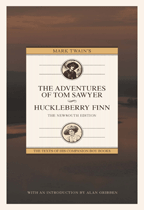 Today an article by Marc Schultz was posted on the Publishers Weekly site. The post, titled “Upcoming NewSouth 'Huck Finn' Eliminates the 'N' Word,” has brought along a fun little storm of opinions.
Today an article by Marc Schultz was posted on the Publishers Weekly site. The post, titled “Upcoming NewSouth 'Huck Finn' Eliminates the 'N' Word,” has brought along a fun little storm of opinions.I, for one, think that this is a difficult scenario to defend or attack. On one hand, the book will become more accessible to certain classrooms and audiences that are more sensitive to the effects of words like “nigger.” On the other hand, though, this eliminates part of the text that engages so many in conversations about these same effects on readers and society. I can also see the appeal of a “clean” version of the book, especially with the rash of books being banned and challenged based on a single word choice. Schultz writes:
Mark Twain's Adventures of Huckleberry Finn is a classic by most any measure—T.S. Eliot called it a masterpiece, and Ernest Hemingway pronounced it the source of "all modern American literature." Yet, for decades, it has been disappearing from grade school curricula across the country, relegated to optional reading lists, or banned outright, appearing again and again on lists of the nation's most challenged books, and all for its repeated use of a single, singularly offensive word: "nigger."
Dr. Gribben, the man responsible for writing out this new version of the text, has decided to replace the dreaded “n” word with the much less explosive “slave.” Many consider Twain’s work to be very much about race and it seems problematic to simply change a racial term to a term of social status, at least in some ways.
"This is not an effort to render Tom Sawyer and Huckleberry Finn colorblind," said Gribben, speaking from his office at Auburn University at Montgomery, where he's spent most of the past 20 years heading the English department. "Race matters in these books. It's a matter of how you express that in the 21st century."
But this cleaning up has led to backlash amongst Twain scholars, including Thomas Wortham, at UCLA.
[He] compared Gribben to Thomas Bowdler (who published expurgated versions of Shakespeare for family reading), telling [Publishers Weekly] that “a book like Professor Gribben has imagined doesn't challenge children [and their teachers] to ask, ‘Why would a child like Huck use such reprehensible language?' "
As I stated earlier in this post, another way of seeing this is that a wider audience might be reached because now those who would have the book disappear from the shelves may finally be willing to see their children read Mr. Twain. The publisher of Dr. Gribben’s edition, NewShouth, takes this line of thinking:
the heart of the matter is opening up the novels to a much broader, younger, and less experienced reading audience: "Dr. Gribben recognizes that he's putting his reputation at stake as a Twain scholar," said La Rosa. "But he's so compassionate, and so believes in the value of teaching Twain, that he's committed to this major departure. I almost don't want to acknowledge this, but it feels like he's saving the books. His willingness to take this chance—I was very touched."
I have not yet decided if I fully support the idea of taking out the “n” word in order to reach a larger audience. I like when a wide audience can be reached with literature, but I have a hard time believing that books should be changed from what they are in order to do so. To remove or change words and language is to change meaning and understanding. Sure some children may now be allowed to read the book, but their understanding will change with the new language, will it not? The book will supposedly have a long and informative foreword to explain the change of words, but will this not plant the original word in people’s minds when they read the new version? “Oh, that says ‘slave’ which means it originally said…”
What do you think about this? Would you or will you read this new version?
Don't change the word; change peoples' attitudes: context, context, context, people!!!! Some poeple's blind adherence to "political correctness" can be as damaging as the ills they think they are addressing.
ReplyDeleteChange the word; it's a children
ReplyDeletes book, classic, yes but times change and so does our language. What will it accomplish? That change is acceptable and nothing to fear. It's a great story that targets children; and they don't need to reinforce racists terms in them.
I would hesitate to classify Huck Finn as purely children's literature. Most editions are classified by the library of congress under the PS designation, which is just American Literature, as opposed to the much fewer editions cataloged under PZ, which is the Juvenile Fiction category.
ReplyDeleteOf course, that being said, many children read this book in school, so it is still very accessible for that audience. For this reason, I think the language should stay as is, as a lesson on the past and the ways in which language was used to segregate and marginalize, much as it is used for other minority groups today.
ReplyDelete